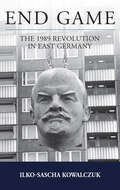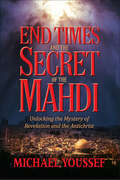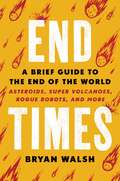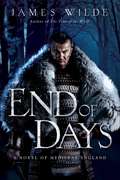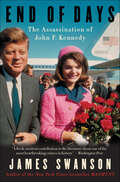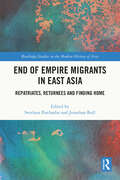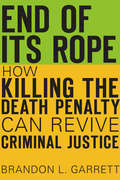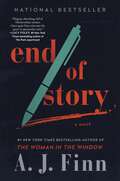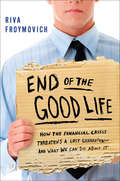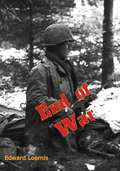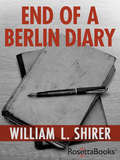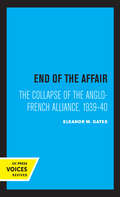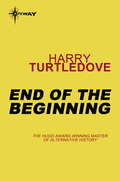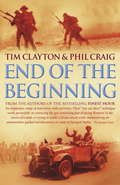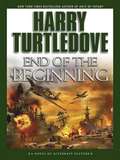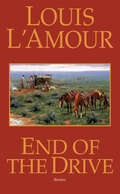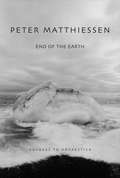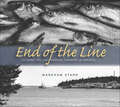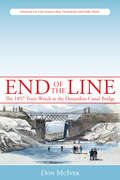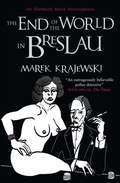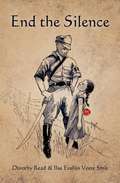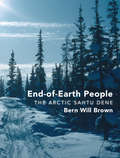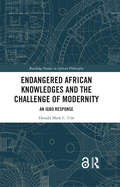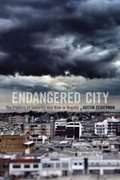- Table View
- List View
End Game: The 1989 Revolution in East Germany (Studies in German History #26)
by Ilko-Sascha KowalczukThe fall of the Berlin Wall, and the chain of events leading up to it, arguably constitute one of the most thoroughly documented episodes in recent history. Nonetheless, most accounts have focused predominantly on high-level politics and diplomacy along with the most dramatic and photogenic public displays. End Game, a rich, sweeping account of the autumn of 1989 as it was experienced “on the ground” in the German Democratic Republic, powerfully depicting the desolation and dysfunction that shaped everyday life for so many East Germans in the face of economic disruption and political impotence. Citizens’ frustration mounted until it bubbled over in the form of massive demonstrations and other forms of protest. Following the story up to the first free elections in March 1990, the volume combines abundant detail with sharp analysis and helps us to see this familiar historical moment through new eyes.
End Times and the Secret of the Mahdi: Unlocking the Mystery of Revelation and the Antichrist
by Michael YoussefThe emergence of Radical Islamists should be no surprise to students of Scripture. America is only now understanding their intense passion to rule, not only the Middle East, but the western world as well. Youssef points to passages that show us how biblical prophecy speaks to the awful things to come. Beware of the secret of the Mahdi!
End Times: A Brief Guide to the End of the World
by Bryan WalshWhat is going to cause our extinction?How can we save ourselves and our future?End Times answers the most important questions facing humankindEnd Times is a compelling work of skilled reportage that peels back the layers of complexity around the unthinkable-and inevitable-end of humankind. From asteroids and artificial intelligence to volcanic supereruption to nuclear war, 15-year veteran science reporter and TIME editor Bryan Walsh provides a stunning panoramic view of the most catastrophic threats to the human race.In End Times, Walsh examines threats that emerge from nature and those of our own making: asteroids, supervolcanoes, nuclear war, climate change, disease pandemics, biotechnology, artificial intelligence, and extraterrestrial intelligence. Walsh details the true probability of these world-ending catastrophes, the impact on our lives were they to happen, and the best strategies for saving ourselves, all pulled from his rigorous and deeply thoughtful reporting and research.Walsh goes into the room with the men and women whose job it is to imagine the unimaginable. He includes interviews with those on the front lines of prevention, actively working to head off existential threats in biotechnology labs and government hubs. Guided by Walsh's evocative, page-turning prose, we follow scientific stars like the asteroid hunters at NASA and the disease detectives on the trail of the next killer virus.Walsh explores the danger of apocalypse in all forms. In the end, it will be the depth of our knowledge, the height of our imagination, and our sheer will to survive that will decide the future.
End of Days: A Novel of Medieval England (Hereward Ser. #3)
by James WildeThe forgotten saga of England's real-life Robin Hood--Hereward--continues in this new brutal and thrilling novel set during the latter days of the Norman Conquest. England, 1071. Five years have passed since the crushing Norman victory at the Battle of Hastings. The country reels under the savage rule of the new king, the one they call 'the Bastard.' The North has been left a wasteland--villages razed, innocents put to the sword, land stolen. It seems no atrocity is too great to ensure William's grip upon the crown. And now he turns his cold gaze east, towards the last stronghold of the English resistance. After years of struggle, he will brook no further challenge to his power: his vast army masses and his siege machines are readied. In their fortress on the Isle of Ely, the English have put their faith in the only man who might defeat the murderous invaders. He is called Hereward. He is a warrior and a master tactician - as adept at slaughter as his enemy and plans have been been set in motion for a bloody uprising that will sweep the Norman king off the throne once and for all. But Hereward is missing. With their hopes of victory dwindling, can the English rebels find the leader who seems to have abandoned them before William the Bastard begins his final, devastating assault that will truly be the end of days? Here is a tale of heroism and treachery--and the bloodiest rebellion England has ever known.
End of Days: The Assassination of John F. Kennedy
by James SwansonIn End of Days, James L. Swanson, the New York Times bestselling author of Manhunt: The 12-Day Chase for Lincoln's Killer, brings to life the minute-by-minute details of the JFK assassination—from the Kennedys' arrival in Texas through the shooting in Dealey Plaza and the shocking aftermath that continues to reverberate in our national consciousness fifty years later.The assassination of John F. Kennedy on November 22, 1963, has been the subject of enduring debate, speculation, and numerous conspiracy theories, but Swanson's absorbing and complete account follows the event hour-by-hour, from the moment Lee Harvey Oswald conceived of the crime three days before its execution, to his own murder two days later at a Dallas Police precinct at the hands of Jack Ruby, a two-bit nightclub owner.Based on sweeping research never before collected so powerfully in a single volume, and illustrated with photographs, End of Days distills Kennedy's assassination into a pulse-pounding thriller that is sure to become the definitive popular account of this historic crime for years to come.
End of Empire Migrants in East Asia: Repatriates, Returnees and Finding Home (Routledge Studies in the Modern History of Asia)
by Svetlana Paichadze Jonathan BullThis book provides an interdisciplinary study about the migration of approximately 9 million people who became end of empire migrants in East Asia following the collapse of the Japanese Empire in 1945. Through the collection of first-hand testimonies and examination of four key themes, the book uncovers how the Japanese government’s repatriation policy intersected with people’s experiences of end of empire migration in East Asia. The first theme, repatriation as historiography and discourse, examines how repatriation has been studied, debated and represented in Japan since the end of the Second World War. The second theme, finding home in the former empire, reveals the diversity of experiences of the peoples of former colonies as the borders ‘shifted under their feet’ through first-hand testimony. The third theme, government policy, explores the changing Japanese government policy from the 1950s to the 1970s. The fourth theme, integration after repatriation, reveals how Japanese former colonial residents integrated into Japanese society following repatriation. Presenting the collective research of 14 international authors, this book will be of interest for researchers of East Asian history, modern Japanese history, migration studies, postcolonial studies, Japanese studies, Korean studies, post-war international relations and Cold War history.
End of Its Rope: How Killing the Death Penalty Can Revive Criminal Justice
by Brandon L. GarrettToday, death sentences in the U.S. are as rare as lightning strikes. Brandon Garrett shows us the reasons why, and explains what the failed death penalty experiment teaches about the effect of inept lawyering, overzealous prosecution, race discrimination, wrongful convictions, and excessive punishments throughout the criminal justice system.
End of Story: A Novel
by A. J FinnFor fans of Knives Out comes a spellbinding thriller from the author of the #1 New York Times bestseller The Woman in the Window“I’ll be dead in three months. Come tell my story.”So writes Sebastian Trapp, reclusive mystery novelist, to his longtime correspondent Nicky Hunter, an expert in detective fiction. With mere months to live, Trapp invites Nicky to his spectacular San Francisco mansion to help draft his life story . . . while living alongside his beautiful second wife, Diana; his wayward nephew, Freddy; and his protective daughter, Madeleine. Soon Nicky finds herself caught in an irresistible case of real-life “detective-fever.”“You and I might even solve an old mystery or two.”Twenty years earlier—on New Year’s Eve 1999—Sebastian’s first wife and teenage son vanished from different locations, never to be seen again. Did the perfect crime writer commit the perfect crime? And why has he emerged from seclusion, two decades later, to allow a stranger to dig into his past?“Life is hard. After all, it kills you.”As Nicky attempts to weave together the strands of Sebastian’s life, she becomes obsessed with discovering the truth . . . while Madeleine begins to question what her beloved father might actually know about that long-ago night. And when a corpse appears in the family’s koi pond, both women are shocked to find that the past isn’t gone—it’s just waiting.
End of The Good Life
by Riva FroymovichA richly reported examination of the effects of the financial crisis on Generation Y, and a portrait of a generation--and a nation--in crisis.
End of War
by Edward LoomisHe came from Ohio. Young, unsure of himself, innocent. He came to Europe as an infantryman battling his way into the heart of Germany.There he stopped being unsure of himself. He stopped when he first went into battle and heard the singing of bullets close overhead, heard the crump of the four-inch mortars and saw the Tiger tanks rumbling towards him.He grew to maturity when he killed his first German and he stopped being innocent when he bought his first woman...for a bar of chocolate.When the war ended and the fighting died away, how was he to regain his lost innocence? How was he to lose the habits of a killer?There was no one to help him except Chrystel, the refugee with the body of a girl and the heart of a woman. No one but Chrystel...and himself.
End of a Berlin Diary
by William L. Shirer"When I came home from Berlin at Christmas time in 1940, I found most of my fellow countrymen unaware of what Hitler was really up to and somewhat confused as to how he had accomplished his evil designs. Some Americans didn't much care. Since it had been my lot to witness Europe's agony at first hand, I collected some of my notes in a book for the edification of such citizens as cared to read it. This book of notes is, in a way, a sequel to Berlin Diary. It is the end of my own small contribution to the Berlin story. There was a great deal, of course, that a reporter had not been able to learn in the frenzied Nazi capital beyond the Elbe. The sinister plots, the fateful decisions, that had plunged the world into such awful horror and misery had been made in secret. And what had really gone on in Germany after I left? Had defeat and collapse solved the German problem -- at least for the rest of our lifetime ? After the war's end I went back to Berlin to try to find out. I prowled the obscene ruins of the once proud capital and talked with the remnants of the Herrenvolk. At Nuremberg, amidst the debris of the lovely medieval town, I saw the surviving leaders of the Nazi gangster world, who had wielded such monstrous power so arrogantly when last I beheld them, finally brought to justice. Most important of all, I had access to a good part of the fourteen hundred tons of secret German documents that the Allies had captured intact. You will find the essential portions of many of them in this book. I have been content to let the German authors tell in their own inimitable words the dark and almost unbelievable tale of their savagery and deceit. Had these secret archives of the German government been destroyed, as the Nazis intended them to be, much of the truth about our weird period in history would have been buried forever. Now it is here for those who care to learn it. I have also tried to include in this book the thread of another story -- the story of the beginning of the Peace. Reader, you and I have already forgotten the fleeting moment of glory and man's magnificent sense of dedication the day peace descended on this wretched earth. I know that erring mortals cannot remain on the heights for long. But these notes, scribbled down at the time, may help to remind you that many on our side achieved those heights after the war's bloody struggles had brought out their inhuman courage, their bravery, and their wonderful fortitude."
End of a Berlin Diary
by William L. Shirer&“A vivid and unforgettable word picture of the destruction of Nazi Germany&” (The New York Times). A radio broadcaster and journalist for Edward R. Murrow at CBS, William L. Shirer was new to the world of broadcast journalism when he began keeping a diary while on assignment in Europe during the 1930s. It was in 1940, when he was still virtually unknown, that Shirer wondered whether his eyewitness account of the collapse of the world around Nazi Germany could be of any interest or value as a book. Shirer&’s Berlin Diary, which is considered the first full record of what was happening in Germany during the rise of the Third Reich, appeared in 1941. The book was an instant success—and would not be the last of his expert observations on Europe. Shirer returned to the European front in 1944 to cover the end of the war. As the smoke cleared, Shirer—who watched the birth of a monster that threatened to engulf the world—now stood witness to the death of the Third Reich. End of a Berlin Diary chronicles this year-long study of Germany after Hitler. Through a combination of Shirer&’s lucid, honest reporting, along with passages on the Nuremberg trials, copies of captured Nazi documents, and an eyewitness account of Hitler&’s last days, Shirer provides insight into the unrest, the weariness, and the tentative steps world leaders took towards peace.
End of the Affair: The Collapse of the Anglo-French Alliance, 1939 - 40
by Eleanor M. GatesThis title is part of UC Press's Voices Revived program, which commemorates University of California Press’s mission to seek out and cultivate the brightest minds and give them voice, reach, and impact. Drawing on a backlist dating to 1893, Voices Revived makes high-quality, peer-reviewed scholarship accessible once again using print-on-demand technology. This title was originally published in 1981.
End of the Beginning
by Harry TurtledoveSix weeks ago, Imperial Japanese military forces conquered and occupied the Hawaiian Islands. A puppet king sits on Hawaii's throne, his strings controlled by the general of the invasion force. American POWs, malnourished and weak, are enslaved as hard labourers until death takes them. Civilians fare little better, struggling to survive on dwindling resources. And families of Japanese origin find their loyalties divided.Despite the victory, the strain is starting to take its toll on the Japanese. Inhabiting the islands and keeping American, British, and Australian forces at bay are pushing their supply lines to the breaking point.Meanwhile, across the United States, from Pensacola, Florida, to San Diego, California, the military is marshaling its forces. Steel factories and fuel refineries are operating around the clock. New recruits are enlisting, undergoing rigorous training exercises.All for the opportunity to strike back and drive the enemy from American soil...
End of the Beginning
by Phil Craig Tim Clayton1942 - British troops are stranded in the desert, struggling to hold back Rommel's Afrika Corps. Hitler's armies have reached Moscow, and there are murmurs of discontent at home as new doubts emerge about Churchill's leadership. Elsewhere in Europe there is chilling evidence of the mounting persecution of the Jews, stretching from Poland to the Channel Islands. For many, it seems there is little hope. As in their acclaimed bestseller FINEST HOUR, the authors use the personal testimony of ordinary people - In END OF THE BEGINNING we meet again some of the people first encountered in FINEST HOUR, and get to know many more. Troops fighting for Montgomery in the desert, RAF pilots bombing German towns, a young Jewish woman deported to Auschwitz from Guernsey, the reality of the Home Front - these stories and many more paint a vivid picture of human endeavour in time of war. And, sixty years on from the Battle of Alamein, END OF THE BEGINNING tells the controversial truth about one of the most famous battles in history - the importance of its lesser-known predecessor and the months of bitter in-fighting between the Allied generals. With precision and compassion, Phil Craig and Tim Clayton again debunk the myths and explore the realities of a crucial year in the history of Britain.
End of the Beginning (Pacific War Series #2)
by Harry TurtledoveSix weeks ago, Imperial Japanese military forces conquered and occupied the Hawaiian Islands. A puppet king sits on Hawaii's throne, his strings controlled by the general of the invasion force. American POWs, malnourished and weak, are enslaved as hard laborers until death takes them. Civilians fare little better, struggling to survive on dwindling resources. And families of Japanese origin find their loyalties divided. Meanwhile, across the United States, from Pensacola, Florida, to San Diego, California, the military is marshaling its forces. Steel factories and fuel refineries are operating around the clock. New recruits are enlisting, undergoing rigorous training exercises. All for the opportunity to strike back and drive the enemy from American soil...
End of the Drive: Stories (Sacketts #7)
by Louis L'AmourA veteran trail driver, who has survived thundering stampedes and Comanche raids, discovers there's nothing so dangerous as courting a beautiful woman.... A brutally beaten homesteader crawls off to die--only to stumble upon an ancient talisman that restores his will to live....This treasure trove of newly discovered stories captures the grit, grandeur, and glory of the men and women who wielded pistol and plow, Bible and branding iron to tame a wild country. A mysterious preacher rides into town to deliver a warning that leads to a surprising revelation.... And in the full-length novella Rustler Roundup, the hardworking citizens of a law-abiding town are pushed to the edge as rumors of rustlers in their midst threaten to turn neighbor against neighbor.Each of these unforgettable tales bears the master's touch--comic twists, stark realism, crackling suspense--all the elements that have made Louis L'Amour an American legend.From the Paperback edition.
End of the Earth: Voyages to Antarctica
by Peter Matthiessen"Matthiessen chronicles two voyages into the frozen seas that surround a landmass larger than the continental United States, most of it buried under eternal snow and ice as much as three miles deep. Ninety percent of the world's fresh water is locked in this immense ice cap, a remote region profoundly important to our environment. The author addresses the subject with authority and passion, discussing everything from global warming and the ozone layer to the vital role of krill, the teeming crustacean that is the cornerstone of the marine food chain." "Nature lovers - birders especially - will be fascinated by descriptions of more than half of the penguin species and an astonishing array of seabirds, from tiny storm-petrels to magnificent albatrosses, which may soar for years without alighting on land; here too are close encounters with whales, leopard seals, and elephant seals, and elusive creatures such as the oceanic orca. There are also remarkable descriptions of the seldom seen polar rookeries where thousands of emperor penguins stand motionless for months at a time, brooding their giant eggs through the long, cold darkness of Antarctic winter."--BOOK JACKET.
End of the Line: Closing the Last Sardine Cannery in America (The Driftless Connecticut Series)
by Markham StarrAt one time, sardines were an inexpensive staple for many Americans. The 212 photographs in this elegant volume offer a striking document of this now vanished industry. Generations of workers in Maine have snipped, sliced, and packed the small, silvery fish into billions of cans on their way to Americans' lunch buckets and kitchen cabinets. On April 15, 2010, Stinson's Seafood, once the home of Beach Cliff Sardines, shut down the packing line that had made the name world famous. Begun in 1927, Stinson's empire eventually included sardine canneries spread along the Maine coast and a fleet of ships to supply them. With this closing, however, the end of the entire sardine industry in Maine had finally arrived. Photographer Markham Starr was privileged to spend several days at the Stinson factory in Prospect Harbor, one month before it was dismantled, emerging with a collection of remarkable images that transform the parts of the cannery into works of art and capture the resilience of the workers faced with the loss of jobs many had held for decades. This book includes a short essay, and shows the heartland of Maine at its finest.
End of the Line: The 1857 Train Wreck at the Desjardins Canal Bridge
by Don MciverSixty people died in 1857, leaving behind their stories and the tales of those involved. In 1857, the Desjardins Canal bridge collapsed under a Toronto-to-Hamilton train, creating one of the worst railway wrecks in North American history. Sixty lives, including that of the main contractor, were lost. The story of how the Great Western Railway was conceived, where it was located, and how it was constructed is replete with high irony covering political intrigue, commercial skullduggery, and bold entrepreneurship. Woven into the tragic events of that cold March evening are a cross-section of pre-Confederation Canadians whose lives contrasted sharply with the dour stereotypical view of pioneering Canada. End of the Line portrays the personalities of these global travellers, burgeoning industrialists, and simple railway servants – all connected by the common thread of catastrophe. Particular attention is focused on the little-known life of Samuel Zimmerman – the irrepressible contractor who died in the accident. Captured throughout is the spirit of economic venture infecting the mood of the continent.
End of the World in Breslau
by Marek KrajewskiA man bound, gagged and sealed alive inside a wall to die. Another quartered, his fingers severed. One of the victims was a musician, the other a locksmith. The only detail that the killings have in common - apart from their abnormal savagery - is a page of a calendar with the day of the death marked in blood.To solve these bizarre murders, Criminal Councillor Eberhard Mock must search for answers in Breslau's underworld, a decadent demi-monde he knows all too well. As he pursues the investigation, his marriage is in decline. In revenge for his misdemeanours, Mock's wife embarks on a sexual odyssey of her own involving a mysterious figure who appears to be connected with the apocalyptic fever gripping the city and high society of Breslau in the late Twenties. Mock, himself the most ambiguous and complex of policemen, must confront a cult that preaches the imminent end of the world.
End the Silence
by Dorothy Read Ilse Evelijn Veere SmitEnd the Silence tells the story of Ilse, an Indo-European born into an idyllic childhood in the colonial society of the Dutch East Indies. Ilse's privileged life was forever changed when the Japanese invaded her homeland during World War II. She recounts her years of internment in a Japanese concentration camp on Java. Then, at the war's end she walked out of Camp Halmaheira only to walk into the bloody Indonesian revolution where she was targeted for execution by native freedom fighters. Finally, she tells of the pain she suffered trying to cope with her memories in a family that refused to talk about it. As Ilse recalls the scenes in her remarkable journey, Dorothy Read paints them in the words of both the young Ilse who lived them and today's Ilse who reflects upon them.
End-of-Earth People: The Arctic Sahtu Dene
by Bern Will BrownA history of the "End-of-Earth" Native people of Canada’s far-North Sahtu region. Bern Will Brown, noted northern author, artist, photographer, and respected community leader living in Colville Lake, Northwest Territories, provides new insights and perspectives on the Sahtu Dene, the people referred to as the "Hareskin" in Alexander Mackenzie’s 1793 journal. Having lived among them for over sixty years and as a speaker of their dialect, Brown is well positioned to provide an adventure in history and culture rooted in the Hareskin traditional way of life. End-of-Earth People, his latest contribution and a valuable record of the North, is a portrait of a people Brown has come to know in ways that anthropologists and ethnologists can only envy.
Endangered African Knowledges and the Challenge of Modernity: An Igbo Response (Routledge Studies in African Philosophy)
by Donald Mark UdeThis book presents an innovative African philosophical response to coloniality and the attendant epistemicide of Africa’s knowledge systems, drawing on Igbo thinking.This book argues that theorizing modernity requires a critical conversation between African and Western scholarship, in order to unpack its links with coloniality and the subjugation of Africa’s indigenous knowledges. In setting out this discussion, the book also connects with Latin American scholarship, demonstrating how the modern world is structured to marginalize and destroy knowledges from across the Global South. This book draws on Igbo epistemic resources of solidarity thinking, positioned in contrast to capitalist knowledge-patterns, thereby providing an important Africa-driven response to modernity and coloniality. This book concludes by arguing that the Igbo sense of solidarity is useful and relevant to modern contexts and thus constitutes a vital resource for a less disruptive, more balanced, and more wholesome modernity.At a time of considerable global crises, this book makes an important contribution to philosophy both within Africa and beyond.
Endangered City: The Politics of Security and Risk in Bogotá
by Austin ZeidermanSecurity and risk have become central to how cities are planned, built, governed, and inhabited in the twenty-first century. In Endangered City, Austin Zeiderman focuses on this new political imperative to govern the present in anticipation of future harm. Through ethnographic fieldwork and archival research in Bogotá, Colombia, he examines how state actors work to protect the lives of poor and vulnerable citizens from a range of threats, including environmental hazards and urban violence. By following both the governmental agencies charged with this mandate and the subjects governed by it, Endangered City reveals what happens when logics of endangerment shape the terrain of political engagement between citizens and the state. The self-built settlements of Bogotá's urban periphery prove a critical site from which to examine the rising effect of security and risk on contemporary cities and urban life.
